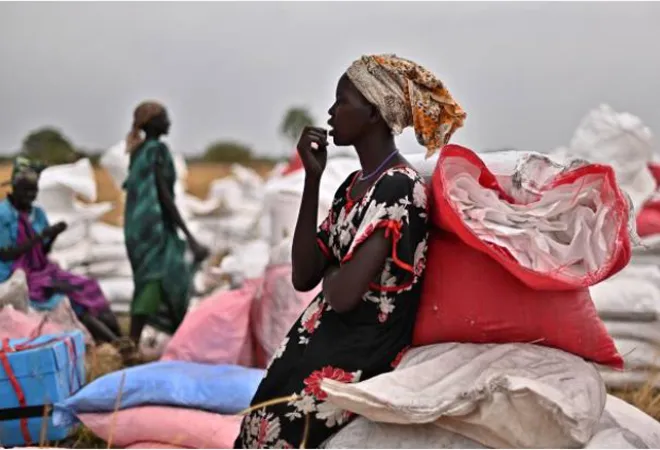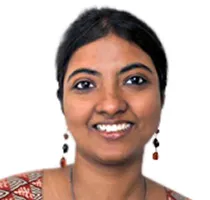
Madagascar, one of the poorest countries of the world, where nearly
75 percent of the population lives on less than US $1.9 a day, has been severely hit by droughts and the pandemic. The country has witnessed below average rainfall since 2015, but the current drought is the most acute one since 1981. Rainfall deficit has led to massive crop failures in the three southern regions of Androy, Anosy, and Atsimo Andrefana and has also adversely affected the livestock. Moreover, the outbreak of Rift Valley Fever (RVF) has led to a further decline in animal prices. According to figures from the Food and Agriculture Organisation, about
1.14 million people are currently living in acute food insecurity, out of which about
14,000 people are living in IPC (Integrated Food Security Phase Classification) Phase 5 conditions. The children in Southern Madagascar are severely undernourished. According to UNICEF estimates, nearly
0.5 million children are acutely malnourished, out of which
110, 000 are in severe condition.
Rainfall deficit has led to massive crop failures in the three southern regions of Androy, Anosy, and Atsimo Andrefana and has also adversely affected the livestock.
Most experts and international agencies hold severe drought to be the main reason behind the famine-like conditions prevailing in Southern Madagascar. Noted scholar,
Jeremy Williams, argues that climate change is rewriting the existing knowledge on famines and asserts that Southern Madagascar is experiencing the first famine in modern history that is solely caused by global warming.
While recurrent droughts related to climate change are responsible for the massive loss of crops in Southern Madagascar, food production data do not suggest a dramatic shortage of rice in the country. The
FAO predicts that the country’s paddy production in 2021 will be above average though a slight decline from the high output of 4.2 million tonnes in 2020 is likely. Further, cereal import requirements are also slated to increase moderately by about 4 percent (see Figure).
Figure 1: Madagascar’s cereal imports in ‘000 tonnes
 Note: Cereals include rice, wheat, and maize
Note: Cereals include rice, wheat, and maize
Source: FAO (2021)
Thus, Madagascar’s famine falls perfectly within Amartya Sen’s entitlement failure theory. A decline in rice output on account of weather fluctuations in one part of the country should not ideally result in a famine in the affected parts of the country because food can easily be moved into deficient areas from surplus regions or increased imports and aid. The drop in food production in the drought-affected regions of Madagascar has led to a direct and exchange entitlement failure of the households in the south and impaired their ability to access food. About two-thirds of the households in Madagascar consume their own rice production. As a result, a sharp drop in the production of rice means a fall in direct entitlements of the households. For net buyers of food, crop failures also mean an exchange entitlement failure as their ability to buy food in the lean period is curtailed due to a fall in their incomes. Moreover, people in south Madagascar mostly rely on casual labour and go to the urban areas for work during the lean season. Due to the COVID-19 restrictions, they were not able to move to the urban areas while there were no jobs in the fields due to the drought. The dramatic rise in the price of rice (about 30 percent above previous-year values) have further eroded the purchasing power of the people.
The drop in food production in the drought-affected regions of Madagascar has led to a direct and exchange entitlement failure of the households in the south and impaired their ability to access food.
Moreover, the Malagasy people are also amongst the poorest in the world and their resilience to shocks is very low due to abject poverty. While relief activities by international agencies have picked up, getting aid to the people who need it, has proved to be challenging. Firstly, due to the shortage of resources, food distribution by international agencies are mostly limited to half-day rations while some villages are receiving no aid at all. Secondly, the semi-arid southern regions have many remote villages and few paved roads which make aid delivery very difficult. It takes at least three days to drive from the capital Antananarivo to the main town in Amboasary district, and from there, it can take many hours to reach the remote villages worst affected by the famines. Restrictions on entering and travelling within the country due to the COVID-19 pandemic, imposed earlier in the year, further prevented the smooth functioning of aid agencies.
The pandemic has also unleashed immense economic distress on the country’s economy. In 2020, the country went into recession with a
4-percent decline in real GDP. The current account deficit worsened due to the sharp decline in exports and tourism. Further, the budget deficit deteriorated to
6.3 percent due to a decline in tax revenues and an increase in government spending on account of the pandemic. As such, the government’s ability to address the crisis through fiscal means is almost absent.
Severe droughts, famine, COVID-19, and economic recession have already caused immense hardship to the Malagasy people. The international community must expand the scale of relief operations to help this poor nation. However, while Madagascar needs significant food aid immediately to save lives and end the raging famine in the Southern parts of the country, there is a need to step up efforts to climate-proof its agriculture and improve the resilience of people. The country is extremely vulnerable to climate change and given the high incidence of poverty, low agricultural productivity, and poor resilience, there is an urgent need to step up adaptation efforts in the country. As a small island nation with limited resources needs funds for adaptation. But is anyone listening?
The views expressed above belong to the author(s). ORF research and analyses now available on Telegram! Click here to access our curated content — blogs, longforms and interviews.



 Madagascar, one of the poorest countries of the world, where nearly
Madagascar, one of the poorest countries of the world, where nearly 
 PREV
PREV


